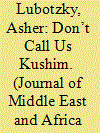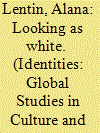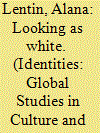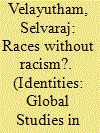|
|
|
Sort Order |
|
|
|
Items / Page
|
|
|
|
|
|
|
| Srl | Item |
| 1 |
ID:
188639


|
|
|
|
|
| Summary/Abstract |
During the 1960s, several hundreds of African students attended long-term academic or vocational programs in Israel. For Israel, offering higher education to Africans was considered a way to strengthen its influence in decolonizing Africa, while for African states, it was a means to gain vital technical expertise and reduce reliance on ex-colonial powers or the Cold War superpowers. African international students, however, were not merely pawns in this larger international political game. Responding to everyday racism and influenced by radical and Pan-Africanist ideas of the turbulent sixties, these students became active participants and commentators within Israeli society. They employed diverse strategies to promote anti-racist and anti-colonial causes, engaging in political activism at levels that were uncommon in the Israeli student social scene. By doing so, African students in Israel contested local prejudices about Africa and Africans and taught the hosting society important lessons on political awareness, broad-mindedness, acceptance, and racial tolerance. This history tells of understudied aspects of the global Black-Jewish relations in the 1960s. It also provides a novel perspective on Israeli society – one that surpasses the well-discussed Jewish-Arab or Ashkenazi-Mizrahi divisions – and contributes to the scholarly understanding of the meanings and manifestations of Blackness in Israel.
|
|
|
|
|
|
|
|
|
|
|
|
|
|
|
|
| 2 |
ID:
167653


|
|
|
|
|
| Summary/Abstract |
Smartphone apps for anti-racism education and intervention are being developed by organisations in various countries. The ubiquity of smartphone use and app methodology, as Grant argues, have the potential to disrupt racial knowledges and facilitate anti-racist action. I use Nicholas Mirzoeff’s ‘zones of appearance and non-appearance’ and Derek Hook’s discussion of ‘racialising embodiment’ to discuss the potential of one such app, Everyday Racism, to challenge and disrupt white supremacy. The Australian-based app uses gamification to encourage users to participate in ‘bystander anti-racism’. However, by failing to question the neutrality of the default white bystander, the app risks reproducing hegemonic constellations of white agency versus racialized inaction. I argue that, in the zone of appearance, it is not enough to make racism apparent. It is necessary to appear. To appear first requires exposing nonappearance including the role even of the well-intentioned in maintaining it
|
|
|
|
|
|
|
|
|
|
|
|
|
|
|
|
| 3 |
ID:
168187


|
|
|
|
|
| Summary/Abstract |
Smartphone apps for anti-racism education and intervention are being developed by organisations in various countries. The ubiquity of smartphone use and app methodology, as Grant argues, have the potential to disrupt racial knowledges and facilitate anti-racist action. I use Nicholas Mirzoeff’s ‘zones of appearance and non-appearance’ and Derek Hook’s discussion of ‘racialising embodiment’ to discuss the potential of one such app, Everyday Racism, to challenge and disrupt white supremacy. The Australian-based app uses gamification to encourage users to participate in ‘bystander anti-racism’. However, by failing to question the neutrality of the default white bystander, the app risks reproducing hegemonic constellations of white agency versus racialized inaction. I argue that, in the zone of appearance, it is not enough to make racism apparent. It is necessary to appear. To appear first requires exposing nonappearance including the role even of the well-intentioned in maintaining it.
|
|
|
|
|
|
|
|
|
|
|
|
|
|
|
|
| 4 |
ID:
153681


|
|
|
|
|
| Summary/Abstract |
In Singapore, race has a prominent place in the city state’s national policies. Its political ideology of multiracialism proclaims racial equality and protection for minority groups from racial discrimination. However, despite official rhetoric and policies aimed at managing and integrating the different ethnic groups, some scholars have argued that institutional racism does exist in Singapore. While it is public knowledge, with few exceptions, racist provocations and experiences of racism are not publicly discussed. In recent years, the advent of social media has made it possible for Singaporeans oftentimes unwittingly to express racially derogatory remarks. This has highlighted that racism is much more deep rooted. Yet, it still remains the white elephant in the room. This paper examines the sociopolitical context that has contributed to everyday racial discrimination and calls for a public acknowledgement of racism so as to combat racist practices.
|
|
|
|
|
|
|
|
|
|
|
|
|
|
|
|
|
|
|
|
|